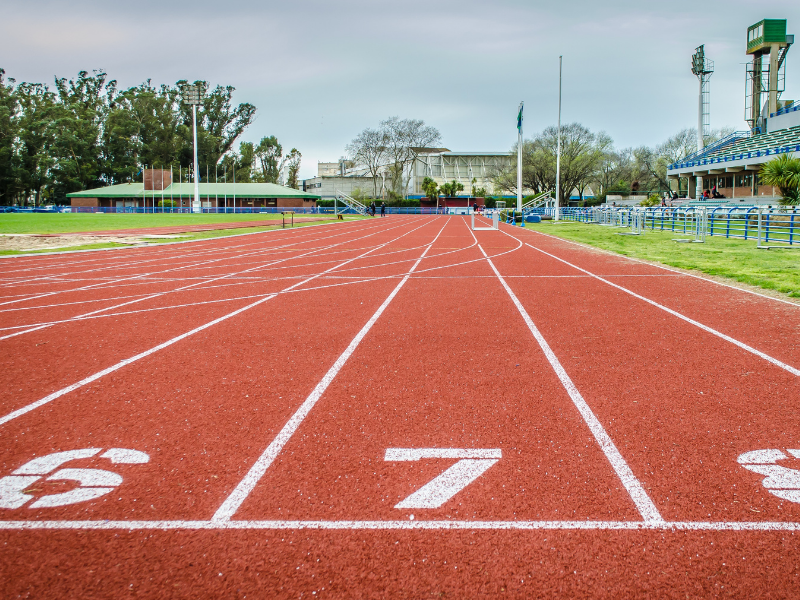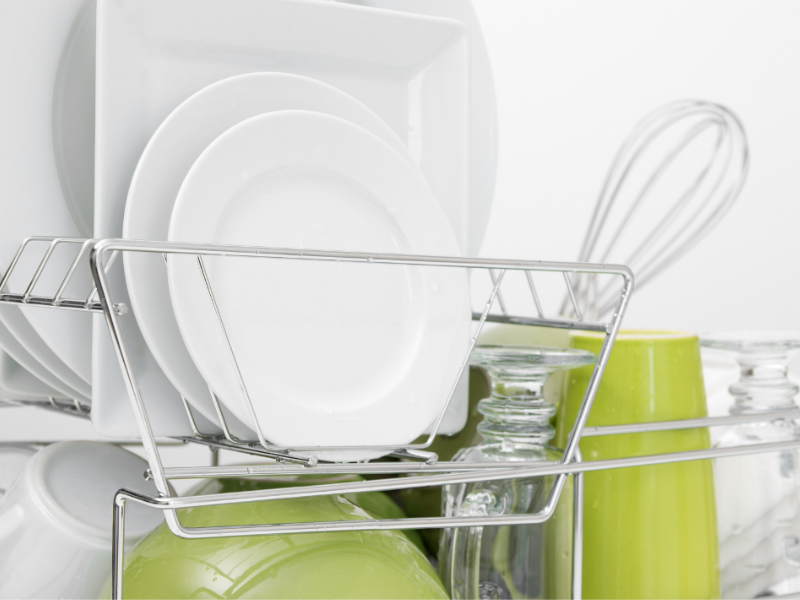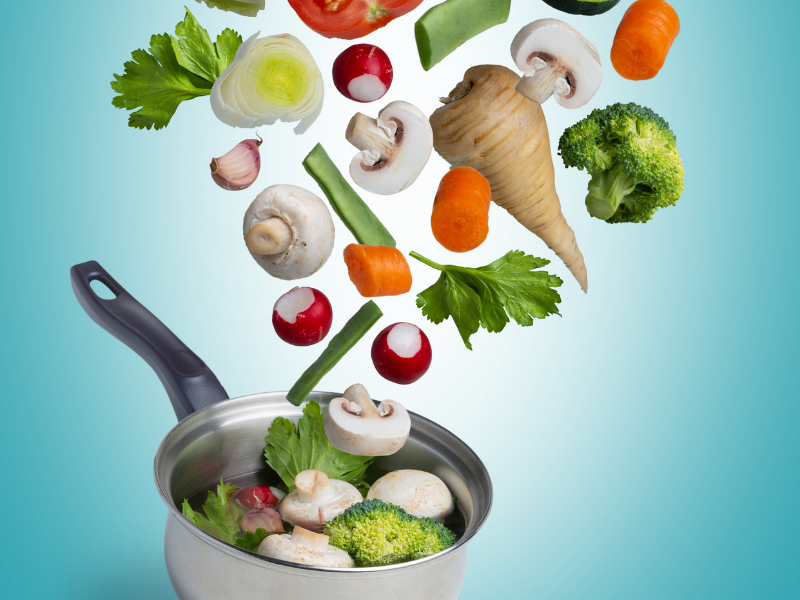Carbs or protein? When it comes to living a healthy lifestyle, two fundamental pillars are nutrition and physical activity. These can contribute to lowered risk of so many physical diseases and conditions along with improved mental health and well-being.
Healthy dietary recommendations include minimum levels of nutrients you need every day. These include protein, healthy fats, vitamins, and minerals. But there are some additional nutrition recommendations for athletes, whether you’re competitive or recreational. I am often asked about eating carbs or protein before a workout.
Carbs or protein before a workout?
Which is better? What are the advantages of eating carbs or protein before a workout? Let’s talk about fueling for performance.
Fueling your body for performance is going to play a key role to help you reach or exceed your fitness goals. When it comes to activity, the 2018 Physical Activity Guidelines for Americans recommends about 30 minutes of activity 5 days each week (or about 150 minutes per week). You may do that much activity, or you may do much more.
The nutrition recommendations I’m sharing in this article apply to both dedicated, competitive athletes looking for an edge over the competition, as well as recreational “weekend warriors.” Whichever scenario you’re in, if you are active, you need to know these. Read on to learn many of the foods that are filled with the energy and nutrients necessary for training and adequate recovery—and the ideal timing so you know when to consume them.
Nutrients for athletic performance
There are several nutrients to pay attention to when you’re being physically active. They are: fluids, calories, carbohydrates, and protein.
Fluids
Water is the most important nutrient for athletic performance because it keeps the body hydrated and at the right temperature. During one hour of vigorous exercise, your body can lose several liters of sweat. As little as a two percent drop in hydration can negatively impact your performance.
How do you know how much fluid to drink? In general, clear urine is a sign of adequate hydration, so keep this in mind and be sure to drink plenty of fluids even if you won’t be exercising right away. And when you are exercising, drink the recommended amounts at the recommended times outlined in the section below, even if you don’t feel thirsty.
Calories
If you’re very physically active, you’re going to need more calories than someone who is not very active. You need fuel to provide your body the strength and energy it needs to perform. But, be careful. People tend to overestimate the number of calories burned during their workouts, so be sure not to take in too many extra calories.
For example, a competitive male athlete needs 2,400-3,000 calories per day, and a competitive female athlete needs 2,200-2,700 calories per day. If you’re not competitive, you don’t need this many. Mayo Clinic has a calorie calculator that can help you estimate your specific needs.
Carbohydrates
Carbohydrates are the fuel your muscles burn when they are working.
There are two types of carbohydrates: simple and complex. Simple carbohydrates are sugars found in sodas and sweetened foods and often provide a lot of energy, but rarely provide many vitamins or minerals. Simple carbohydrates are also found in white pastas, breads, and cereals. Complex carbohydrates, on the other hand, are starches and contain more nutrients including vitamins, minerals, and fiber. Examples of foods with complex carbohydrates include fruits, starchy vegetables, whole grains, legumes, nuts, and seeds.
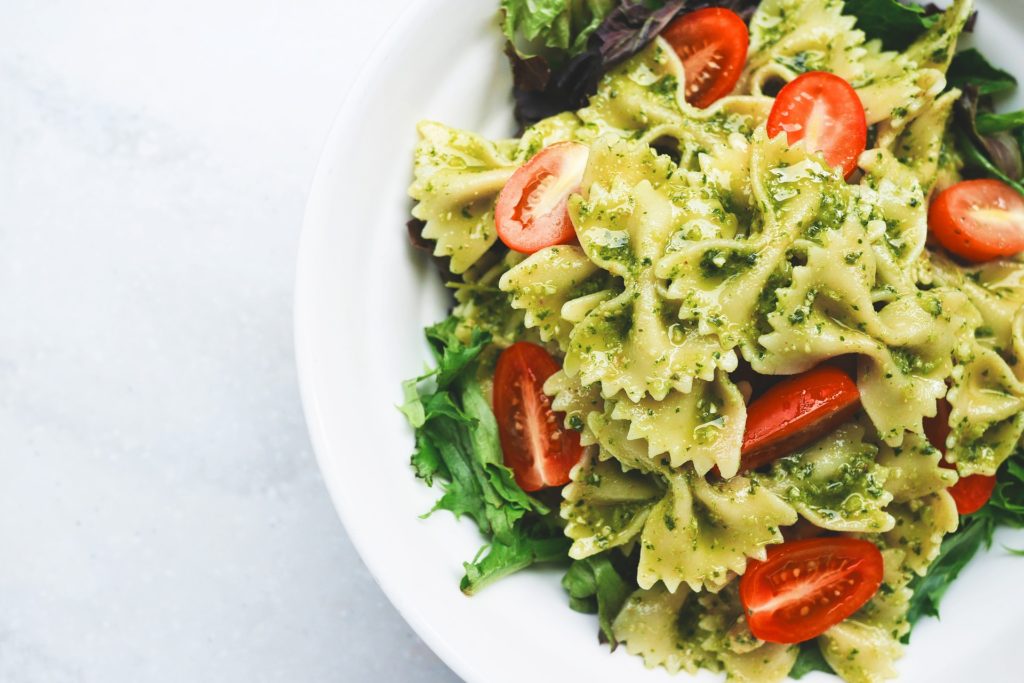
For your everyday carbohydrate needs, stick to complex carbohydrates. However, when it comes to vigorous exercise, simple carbohydrates can be used before, during, and after an intense workout. This is because more intense exercise needs more carbohydrates to immediately burn as fuel. Having simple carbohydrates helps you feel more energized before a workout, work harder, and recover faster, but they’re not recommended as your primary source of carbohydrates.
Protein
Protein is an essential component of muscles (in addition to its importance for other functions such as tissue repair, bones, immunity, enzymes, neurotransmitters, etc.) and that’s why your protein intake is particularly important if you’re focusing on muscle-building resistance exercises. Also, once carbohydrate stores are used up, your body can turn to protein as an alternative fuel source. That’s why some athletes need more protein than non-athletes. For example, many athletes need up to 2 grams protein/kg/day, or if doing intense training, then up to 2.2 grams protein/kg/day.
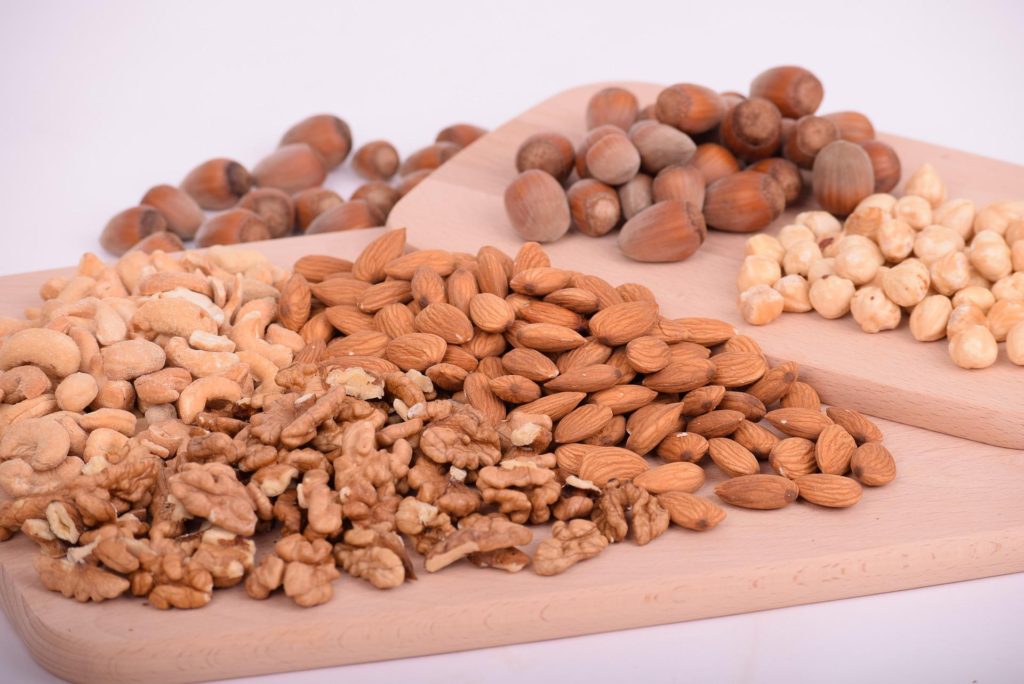
This doesn’t mean that you need to focus on high-protein foods or use protein supplements if you’re eating enough calories. That’s because most Americans already eat twice as much protein as they really need. Recommended sources of protein include lean meats, eggs, dairy, nuts, and legumes.
Carbs or protein before workout? Nutrition for different types of exercise
By consistently eating a range of nutrient-dense foods and staying hydrated, you can continue to improve your performance (and health) over time. Here are a few key nutrition recommendations on how to fuel yourself for performance depending on the type of workout you’re doing and how long it’s going to last.
Before any workout
To avoid dehydration, drink about 2 cups of water about 2 hours before your workout.
PRO TIP:
If you want to measure the approximate amount of fluids you are losing by working out, weigh yourself immediately before and after your workout. The difference in weight will be mostly due to the amount of water lost so you can follow the guidelines below on what to consume after your workout to replace those fluids.
When it comes to food, if your goal is to improve your athletic performance, say for a big game, don’t exercise on an empty stomach. Have a small meal, ideally with fibrous carbohydrates and only small amounts of fat, about 60-90 minutes beforehand. – a burrito bowl with beans and veggies, a whole grain pasta salad, hummus and veggies, or a baked potato with cottage cheese would be great options.
If you’re going to work out for less than one hour
Water is your fluid of choice. Drink up to 1 cup every 15-20 minutes throughout your workout.
If you’re going to work out for more than one hour
Before you get started, have some carbohydrates and limit the amount of fat you consume. That might look like a glass of juice, cup of yogurt, or an English muffin with jam.
If your 60+ minutes of activity is going to be an intense aerobic workout, you’re also going to want to have lots of fluids and some carbohydrates during that time. Drink up to 1 cup of water every 15-20 minutes for the first hour.
For your second and subsequent hours you are going to need to replace lost electrolytes and carbohydrates. It is at this point where you can switch your fluid to a sports drink if you want to. Aim for 5-10 ounces every 15-20 minutes. If you choose to stick with water (instead of a sports drink) for your second hour and beyond, add in some food sources of electrolytes and carbohydrates such as 2-3 handfuls of pretzels or a half of a cup of low-fat granola.
After any workout
Exercise depletes the stores of fluids and energy in your body. Depending on how hard you worked out, you may need to top it up. In general, replace the weight you lost during your training session with fluids. This means that for every pound you lose exercising, drink about 3 cups of fluid within the next 6 hours.
If you were active for less than 60 minutes, you can replace your lost fluid weight with water. If you trained for more than 90 minutes, you’re going to want to have more carbohydrates with a bit of protein two hours later. This can be a sports bar, trail mix with nuts, or yogurt with granola.
The bottom line
Whether you’re a seasoned competitive athlete or a recreational “weekend warrior,” fueling your body properly can improve your performance. The first nutrient to consider is water, so be sure to hydrate before, during, and after your workout as recommended. It’s also important to take in enough calories, carbohydrates, and proteins because these will help power your workout, replenish lost nutrients, and give your body the substances it needs to repair itself afterwards.
If you’re wondering whether you may need to change up the way you’re hydrating and fueling your physical activities, consult a registered dietitian who can review your activity levels, health goals, and nutritional status. One of the best ways to nourish yourself is to learn to cook. I can help. Here is a link to the waitlist for my online course for college students who are ready to learn how to cook tasty meals that will meet your dietary needs and will become favorites meals you can share with friends.
References
Bernardot, D. (2018, December 4). American College of Sports Medicine. Ten things you need to know about sports nutrition. https://www.acsm.org/home/featured-blogs—homepage/acsm-blog/2018/12/04/ten-sports-nutrition-facts
Centers for Disease Control and Prevention. (2020, October 7). How much physical activity do adults need? https://www.cdc.gov/physicalactivity/basics/adults/index.htm
Clark, N. (2019, June 18). American College of Sports Medicine. The athlete’s kitchen: Sports nutrition myths busted! https://www.acsm.org/all-blog-posts/acsm-blog/acsm-blog/2019/06/18/sports-nutrition-myths-busted
Clifford, J. and Maloney, K. (n.d.) Colorado State University Extension. Nutrition for the Athlete – 9.362 https://extension.colostate.edu/topic-areas/nutrition-food-safety-health/nutrition-for-the-athlete-9-362/
MedlinePlus. (2019, May 13). Nutrition and athletic performance. https://medlineplus.gov/ency/article/002458.htm
Murray, B. (2019, March 14). American College of Sports Medicine. Everyday nutrition vs. performance nutrition: Clarifying the carbohydrate confusion. https://www.acsm.org/all-blog-posts/certification-blog/acsm-certified-blog/2019/03/14/nutrition-vs.-performance-nutrition-carbohydrate-confusion
Richards, L. (2021, April 20). Medical News Today. Nutrition and athletic performance: What to consider. https://www.medicalnewstoday.com/articles/nutrition-for-athletes
University of Wisconsin School of Medicine and Public Health. (2019, March 4). Eating for peak athletic performance. https://www.uwhealth.org/news/eating-for-peak-athletic-performance

